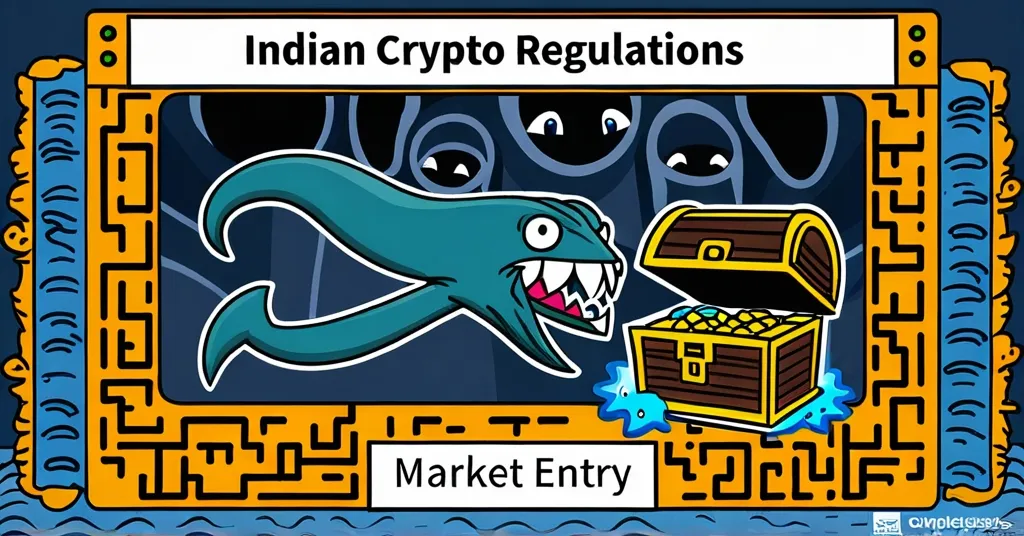Kraken’s Strategic Return to India: Overcoming 2024 Ban and Regulatory Hurdles

Kraken’s Bold Comeback: Navigating the Indian Crypto Market Post-2024 Ban
Kraken, once banned from India, is now making a strategic return. The seventh-largest cryptocurrency exchange by trading volume was excluded from the Indian market in 2024 due to anti-money laundering violations. Now, the exchange is working diligently with local authorities to secure the necessary permits and is leveraging the expertise of new advisors to ensure a successful relaunch.
- Kraken banned in India in 2024 for anti-money laundering violations.
- Working with local authorities to relaunch.
- Vishesh Khurana appointed as advisor for India expansion.
- Faces criticism over Dave Portnoy association.
Background of the Ban
Kraken’s exclusion from India came after it was found non-compliant with the Prevention of Money Laundering Act, resulting in its blacklisting by the Financial Intelligence Unit (FIU). This was part of a broader regulatory sweep that saw nine offshore exchanges barred from operating in the country.
Relaunch Strategy
To spearhead its re-entry, Kraken has enlisted Vishesh Khurana, co-founder of Shiprocket and managing partner at Tribe Capital India, as an advisor. Arjun Sethi, founder of Tribe Capital and Kraken’s co-CEO, will also play a pivotal role in shaping the exchange’s strategy in this lucrative market. Their involvement underscores Kraken’s commitment to understanding and navigating the Indian market effectively. Khurana’s experience in scaling startups and understanding the Indian consumer base will be invaluable in tailoring Kraken’s approach.
Regulatory Landscape
To operate legally in India, exchanges must register with the FIU, implement Know-Your-Customer (KYC) compliance, which involves verifying the identity of clients to prevent fraud, and diligently report suspicious transactions. Additionally, offshore exchanges may need to clear outstanding Goods and Services Tax (GST) obligations, a tax levied on the supply of goods and services, before resuming operations. Kraken’s push for a comeback follows the clearance of other major exchanges like Binance and KuCoin by the FIU, setting a precedent for Kraken’s potential return.
Challenges and Controversies
Despite its strategic moves, Kraken faces challenges beyond regulatory compliance. The exchange has come under fire from the cryptocurrency community for its association with Dave Portnoy, the founder of Barstool Sports. Portnoy’s involvement in memecoin pump-and-dump schemes has raised eyebrows, with one user on X (formerly Twitter) voicing the community’s frustration:
“How long is Kraken going to keep sponsoring Dave Portnoy while he openly mocks the space on a daily basis?”
This controversy highlights the broader issue of market manipulation and the ethical responsibilities of exchanges in managing volatile assets like meme coins. Kraken’s buddy-buddy relationship with Portnoy is causing more than just a ripple—it’s creating a full-blown stink in the crypto community.
Impact and Potential
Kraken’s 2024 revenue of $1.5 billion, more than double its 2023 revenue of $671 million, underscores the exchange’s global significance and its potential to drive crypto adoption in India. As the world’s seventh-largest exchange by trading volume, Kraken’s re-entry could significantly impact the Indian market, fostering competition and innovation. This financial strength could be a key asset in their push for a comeback.
The move to relaunch in India is part of Kraken’s broader global expansion strategy, reflecting a proactive approach to capturing new markets and diversifying revenue streams. However, the exchange must tread carefully, balancing regulatory compliance with community trust and market dynamics.
Counterpoints and Discussion
While Kraken’s return is seen as a positive development, there are potential downsides. Increased competition could lead to market saturation, putting pressure on existing players. Additionally, the association with controversial figures like Dave Portnoy could erode trust among Indian users, who are already wary of crypto scams. Yet, Kraken’s efforts align with the philosophy of effective accelerationism (e/acc), aiming to accelerate the adoption and innovation in the Indian crypto space. By re-entering a market with vast potential, Kraken could spur further development and competition, driving the crypto revolution forward.
Key Questions and Takeaways
- What led to Kraken’s ban in India?
Kraken was banned in India in 2024 for violating anti-money laundering laws. - What steps is Kraken taking to relaunch in India?
Kraken is working with local authorities to secure necessary permits and has appointed Vishesh Khurana as an advisor for its expansion. - What regulatory requirements must cryptocurrency exchanges meet to operate legally in India?
Exchanges must register with the FIU, implement Know-Your-Customer (KYC) compliance, and report suspicious transactions. - Why is Kraken facing criticism from the cryptocurrency community?
Kraken is facing criticism for its association with Dave Portnoy, who has been linked to memecoin pump-and-dump schemes. - Which other exchanges have received clearance from the FIU to operate in India?
Binance and KuCoin have received clearance from the FIU to operate in India.
As Kraken navigates this complex journey, the crypto community watches closely. Will the exchange’s strategic moves and regulatory compliance efforts pave the way for a successful relaunch, or will the shadows of controversy and market manipulation continue to loom large? Only time will tell, but one thing is clear: the future of crypto in India is poised for exciting developments. Kraken’s wallet is getting heavier, but can they navigate the choppy waters of Indian regulations?



